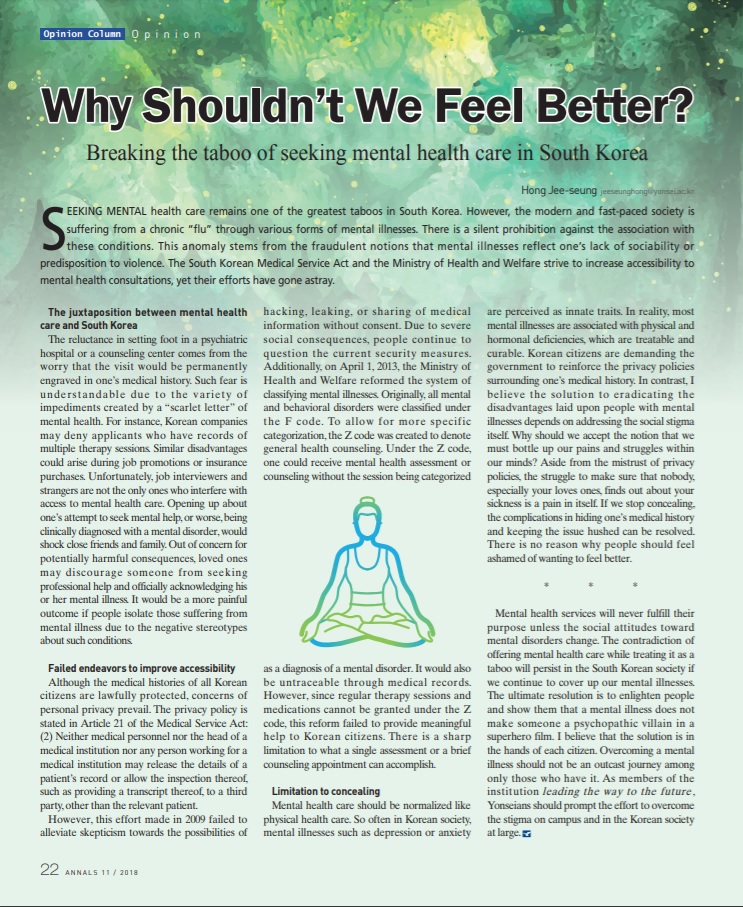Breaking the taboo of seeking mental health care in South Korea

SEEKING MENTAL health care remains one of the greatest taboos in South Korea. However, the modern and fast-paced society is suffering from a chronic “flu” through various forms of mental illnesses. There is a silent prohibition against the association with these conditions. This anomaly stems from the fraudulent notions that mental illnesses reflect one’s lack of sociability or predisposition to violence. The South Korean Medical Service Act and the Ministry of Health and Welfare strive to increase accessibility to mental health consultations, yet their efforts have gone astray.
The juxtaposition between mental health care and South Korea
The reluctance in setting foot in a psychiatric hospital or a counseling center comes from the worry that the visit would be permanently engraved in one’s medical history. Such fear is understandable due to the variety of impediments created by a “scarlet letter” of mental health. For instance, Korean companies may deny applicants who have records of multiple therapy sessions. Similar disadvantages could arise during job promotions or insurance purchases. Unfortunately, job interviewers and strangers are not the only ones who interfere with access to mental health care. Opening up about one’s attempt to seek mental help, or worse, being clinically diagnosed with a mental disorder, would shock close friends and family. Out of concern for potentially harmful consequences, loved ones may discourage someone from seeking professional help and officially acknowledging his or her mental illness. It would be a more painful outcome if people isolate those suffering from mental illness due to the negative stereotypes about such conditions.
Failed endeavors to improve accessibility
Although the medical histories of all Korean citizens are lawfully protected, concerns of personal privacy prevail. The privacy policy is stated in Article 21 of the Medical Service Act: (2) Neither medical personnel nor the head of a medical institution nor any person working for a medical institution may release the details of a patient's record or allow the inspection thereof, such as providing a transcript thereof, to a third party, other than the relevant patient.
However, this 2009 effort failed to alleviate skepticism towards the possibilities of hacking, leaking, or sharing of medical information without consent. Due to severe social consequences, people continue to question the current security measures. Additionally, on April 1, 2013, the Ministry of Health and Welfare reformed the system of classifying mental illnesses. Originally, all mental and behavioral disorders were classified under the F code. To allow for more specific categorization, the Z code was created to denote general health counseling. Under the Z code, one could receive mental health assessment or counseling without the session being categorized as a diagnosis of a mental disorder. It would also be untraceable through medical records. However, since regular therapy sessions and medications cannot be granted under the Z code, this reform failed to provide meaningful help to Korean citizens. There is a sharp limitation to what a single assessment or a brief counseling appointment can accomplish.
Limitation to concealing
Mental health care should be normalized like physical health care. So often in Korean society, mental illnesses such as depression or anxiety are perceived as innate traits. In reality, most mental illnesses are associated with physical and hormonal deficiencies, which are treatable and curable. Korean citizens are demanding the government to reinforce the privacy policies surrounding one’s medical history. In contrast, I believe the solution to eradicating the disadvantages laid upon people with mental illnesses depends on addressing the social stigma itself. Why should we accept the notion that we must bottle up our pains and struggles within our minds? Aside from the mistrust of privacy policies, the struggle to make sure that nobody, especially your loves ones, finds out about your sickness is a pain in itself. If we stop concealing, the complications in hiding one’s medical history and keeping the issue hushed can be resolved. There is no reason why people should feel ashamed of wanting to feel better.
* * *
Mental health services will never fulfill their purpose unless the social attitudes toward mental disorders change. The contradiction of offering mental health care while treating it as a taboo will persist in the South Korean society if we continue to cover up our mental illnesses. The ultimate resolution is to enlighten people and show them that a mental illness does not make someone a psychopathic villain in a superhero film. I believe that the solution is in the hands of each citizen. Overcoming a mental illness should not be an outcast journey among only those who have it. As members of the institution leading the way to the future, Yonseians should prompt the effort to overcome the stigma on campus and in the Korean society at large.
All Yonseians are able to visit the counseling centers on campus.
Sinchon Campus: Baekyang Hall N #408
Yonsei International Campus (YIC): 2nd floor of Wisdom Hall A
Hong Jee-seung
jeeseunghong@yonsei.ac.kr

